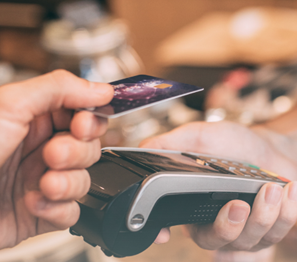
Swipe, tap and thrive: Why every single-location restaurant needs a POS
Learn why a POS system is essential for small quick service restaurants and which features help streamline orders, boost sales, and keep your café running smoothly.

Accepting payments online has become an essential part of running a successful business in Canada. Whether you're managing a small local shop or a growing ecommerce platform, understanding how to process payments online is key to providing convenience for your customers and ensuring a steady cash flow.
Online payment processing is the technology that allows businesses to accept payments through digital platforms. It encompasses everything from credit card transactions to mobile wallet payments, enabling you to cater to the growing demand for seamless, contactless payment methods.
For Canadian businesses, the ability to process payments online is not just about meeting consumer expectations, but also about remaining competitive. Customers increasingly prefer flexible payment options that allow them to make purchases quickly and securely. By enabling online transactions, you can expand your customer base, accommodate varying preferences and enhance the overall shopping experience.
The process may appear complex at first glance, involving multiple components and security protocols, but understanding its mechanics can empower you to make informed decisions. From gateways to processors and secure encryption methods, online payment processing relies on interconnected systems working together to ensure every transaction is fast, accurate and secure.
Online payment processing is essential for ecommerce, allowing businesses to accept digital payments securely and efficiently. It involves multiple steps that transfer funds from customers to merchants while safeguarding sensitive information. Here’s a detailed look at how the process works:
The payment journey begins when a customer selects a product or service and proceeds to check out on the merchant’s website or app. Customers enter their payment details, such as credit or debit card information, digital wallet credentials or bank account details, into a secure payment form. Advanced systems may also offer options like buy-now-pay-later (BNPL) or recurring payments for subscription services.
After submission, the payment information is encrypted, ensuring that sensitive data like card numbers cannot be intercepted or misused. This encrypted data is sent to
a payment gateway, which acts as a secure intermediary between the merchant’s platform and the financial institutions involved in the transaction.
Security is integral to online payment processing. Encryption safeguards data during transmission, while tokenization replaces sensitive details with unique identifiers, minimizing the risk of fraud. Compliance with Payment Card Industry Data Security Standards (PCI DSS) ensures that businesses adhere to strict protocols for handling payment information. Additional measures like multi-factor authentication (MFA) and fraud detection tools further enhance security.
By automating these intricate steps, online payment processing delivers a fast, reliable and secure transaction experience, empowering businesses to meet customer expectations while minimizing risks. As digital commerce continues to grow, advanced payment technologies will further streamline these processes, benefiting both merchants and consumers.
Online payment processing offers numerous advantages that help businesses operate efficiently and improve customer satisfaction. These benefits include:
By leveraging these benefits, businesses can streamline operations, enhance security and position themselves for success.
Accepting online payments is essential for businesses looking to offer convenience and expand their reach. Here’s a step-by-step guide to help you get started:
By implementing these steps, you can create a reliable and secure online payment system that meets customer expectations and supports your business growth. Whether you’re launching a new ecommerce site or expanding your existing payment options, accepting online payments is a crucial component of modern commerce.
Integrating payment processing with your business is essential for streamlining transactions and enhancing customer experiences. By seamlessly connecting your payment system with key tools like accounting software, inventory management systems and ecommerce platforms, you can automate data flow, reduce manual errors and improve efficiency. Integration also enables features such as real-time inventory updates, consolidated reporting and multi-channel payment acceptance, ensuring your operations run smoothly across all sales channels. Choosing a payment processing solution that supports flexible APIs and third-party integrations allows your business to adapt to changing needs while delivering a cohesive and secure payment experience to your customers.
Leveraging Moneris for your online payment needs empowers your business with a trusted, secure and efficient solution tailored to modern commerce. Moneris offers seamless payment processing with support for a wide range of methods, including credit cards, debit cards and digital wallets, ensuring convenience for your customers. With robust security features like encryption, tokenization and PCI compliance, Moneris safeguards sensitive data and reduces fraud risks. Its integration capabilities allow you to connect with ecommerce platforms, accounting software and CRM tools, streamlining operations and enhancing customer experiences. Backed by reliable customer support and advanced analytics, Moneris helps you optimize your payment processes while driving growth in a competitive digital marketplace.
To process payments online, you need a payment gateway, a payment processors and a merchant account. These tools work together to securely capture and transfer customer payment data, enabling smooth and secure transactions for your business.
Implementing PCI DSS compliance, encryption technologies and fraud prevention tools like tokenization can safeguard transactions. Regularly updating systems and partnering with trusted payment providers also enhances security.
Online businesses should accept a variety of payment methods, including credit cards, debit cards and digital wallets like Apple Pay or Google Pay. Offering multiple options ensures you can meet diverse customer preferences.
A payment gateway securely transmits transaction data from your website to the processor. The processor then handles communication between banks to authorize and finalize the transaction, ensuring the funds are properly transferred.
Yes, online payment processing systems are scalable, offering solutions tailored to businesses of all sizes. Many providers offer competitive pricing structures designed to fit small business budgets while delivering robust features.

Learn why a POS system is essential for small quick service restaurants and which features help streamline orders, boost sales, and keep your café running smoothly.

Discover the best POS systems for small retail businesses. Learn how to streamline inventory, boost sales, and improve customer service with the right POS solution.

Learn what card testing fraud is, how it targets your e-commerce site, and the best practices you can use to detect, block, and prevent attacks before they impact your business.

What is contactless payment and how does contactless payment work? Discover how this technology speeds up transactions and improves customer experience with secure, fast processing. Learn what contactless payment is and how contactless payment works to streamline transactions. Find out how it benefits your business with faster and more secure payments.